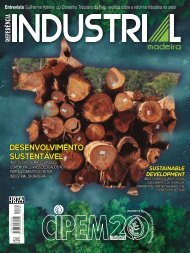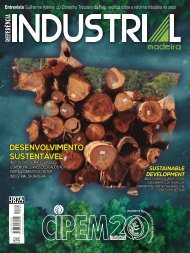MadeiraIndustrial_254Web
You also want an ePaper? Increase the reach of your titles
YUMPU automatically turns print PDFs into web optimized ePapers that Google loves.
ENTREVISTA<br />
COMO AVALIA A POLÍTICA NACIONAL PARA O<br />
SETOR INDUSTRIAL? HÁ MAIS INCENTIVO OU MAIS<br />
DIFICULDADE?<br />
Nos últimos anos, não houve uma política industrial<br />
propriamente dita, mas ações esporádicas, a exemplo da<br />
desoneração da folha de pagamento para alguns setores<br />
e linhas de financiamento específicas. O reflexo disso foi<br />
a crescente desindustrialização precoce da economia<br />
brasileira. Felizmente, estamos presenciando uma nova<br />
preocupação das autoridades em fazer a uma Nova Política<br />
Industrial, a chamada neoindustrilização do Brasil,<br />
que está baseada em uma agenda moderna, com foco<br />
em tecnologia, inovação, energias limpas, ou seja, no desenvolvimento<br />
sustentável. Não podemos, no entanto, esquecer<br />
a indústria tradicional, que pode ser reconfigurada<br />
para alcançar as metas de sustentabilidade. Um primeiro<br />
passo nessa direção é equacionar o problema de financiamento<br />
para o investimento. Nesse sentido, o Governo Federal<br />
deu passo importante ao designar o BNDES (Banco<br />
Nacional de Desenvolvimento Econômico e Social) como<br />
o braço financeiro desse processo, ampliando os recursos<br />
para a indústria. Ao que tudo indica, um novo foco de<br />
industrialização está em curso no BNDES e os números<br />
deste início de ano são promissores. Outro passo que<br />
será decisivo para que o Brasil finalmente entre nos trilhos<br />
do crescimento é a reforma tributária. A indústria vê<br />
com otimismo a mobilização do governo, do congresso<br />
e da sociedade em geral para a construção de um texto<br />
que seja aprovado ainda este ano. Os benefícios de uma<br />
reforma tributária serão amplos, seja para as empresas ou<br />
para os cidadãos. Deve aumentar a competitividade das<br />
nossas exportações e trazer equilíbrio na concorrência<br />
com os importados. Espera-se que somente com a reforma<br />
tributária, haja um crescimento acumulado de 12% do<br />
PIB (Produto Interno Bruto) em 15 anos, com aumento de<br />
R$ 1,2 trilhão, o que representa cerca de R$ 481 por mês<br />
para cada brasileiro. Essas possibilidades fazem acreditar<br />
que o Brasil pode recuperar o protagonismo no cenário<br />
mundial, com a indústria sendo locomotiva desse processo.<br />
QUAIS MEDIDAS ESPERA QUE O GOVERNO ADO-<br />
TE PARA INCENTIVAR A INDÚSTRIA E DIMINUIR O<br />
DESEMPREGO?<br />
Certamente não são medidas simples, não há uma fórmula<br />
mágica capaz de aumentar rapidamente o emprego.<br />
Ao contrário, é preciso persistência e foco para alcançar<br />
esse objetivo, que é desejo de todos nós. Algumas políticas<br />
de expansão do consumo, como retirar restrições do<br />
CPF das pessoas, abrir linhas de crédito, incentivar a construção<br />
de moradias e compra de seus bens, ampliar os<br />
benefícios sociais etc. são todas bem-vindas e necessárias<br />
nesse momento. O país precisa voltar a crescer, as pessoas<br />
precisam recuperar a autoestima, ficando empregadas<br />
e participando do mercado consumidor. Porém, essas políticas<br />
têm data de validade, elas não podem ser usadas<br />
VE OR MORE DIFFICULTY BEING CREATED?<br />
In recent years, there has not been an industrial<br />
policy per se, but somewhat sporadic actions, such as<br />
exempting payroll taxes for some sectors and creating<br />
specific financing lines. The reflection of this was the<br />
growing early deindustrialization of the Brazilian economy.<br />
Fortunately, we are witnessing a new concern of<br />
the authorities in elaborating a New Industrial Policy,<br />
the so-called Neo-industrialization of Brazil, which is<br />
based on a modern agenda, focusing on technology,<br />
innovation, and clean energy, i.e., sustainable development.<br />
We cannot, however, forget traditional industry,<br />
which can be reconfigured to achieve sustainability goals.<br />
The first step in this direction is to address the investment<br />
financing problem. In this sense, the Federal<br />
Government took an important step by designating the<br />
National Bank for Economic and Social Development<br />
(Bndes) as the financial arm of this process, expanding<br />
resources for the Industrial Sector. Apparently, a new<br />
focus on industrialization is underway in Bndes, and the<br />
numbers from the beginning of the year are promising.<br />
Another step that will be decisive for Brazil to get on<br />
the growth track finally is tax reform. The industry sees<br />
with optimism the mobilization of the Government,<br />
Congress, and society in general for the construction of<br />
a text that will be approved later this year. The benefits<br />
of tax reform will be wide-ranging, whether for businesses<br />
or citizens. It must increase the competitiveness<br />
of our exports and balance competition with imports.<br />
It is expected that just with tax reform, there will be a<br />
cumulative growth of 12% of GDP in 15 years, with an<br />
increase of R$ 1.2 trillion, which represents about R$<br />
481 per month for each Brazilian. These possibilities<br />
make us believe that Brazil can regain its leading role<br />
on the world stage, with the Industrial Sector being the<br />
locomotive of this process.<br />
WHAT MEASURES DO YOU EXPECT THE<br />
GOVERNMENT TO TAKE TO ENCOURAGE THE<br />
INDUSTRIAL SECTOR AND LOWER UNEMPLOY-<br />
MENT?<br />
They certainly will not be simple measures; no magic<br />
formula can rapidly increase employment. On the<br />
contrary, it takes persistence and focus to achieve this<br />
goal, which is the desire of all of us. Some policies to<br />
expand consumption, such as removing restrictions on<br />
an Individual’s Tax Registration (CPF), opening lines of<br />
credit, encouraging housing construction and buying<br />
goods, expanding social benefits, etc., are all welcome<br />
and necessary now. The Country needs to grow<br />
again, and people need to regain self-esteem, become<br />
employed, and participate in the consumer market.<br />
However, these policies have an expiration date. They<br />
cannot be used indefinitely because they quickly reach<br />
saturation, either in household debt capacity or in the<br />
physical infrastructure reach of the economy. Therefore,<br />
50 referenciaindustrial.com.br AGOSTO 2023

















